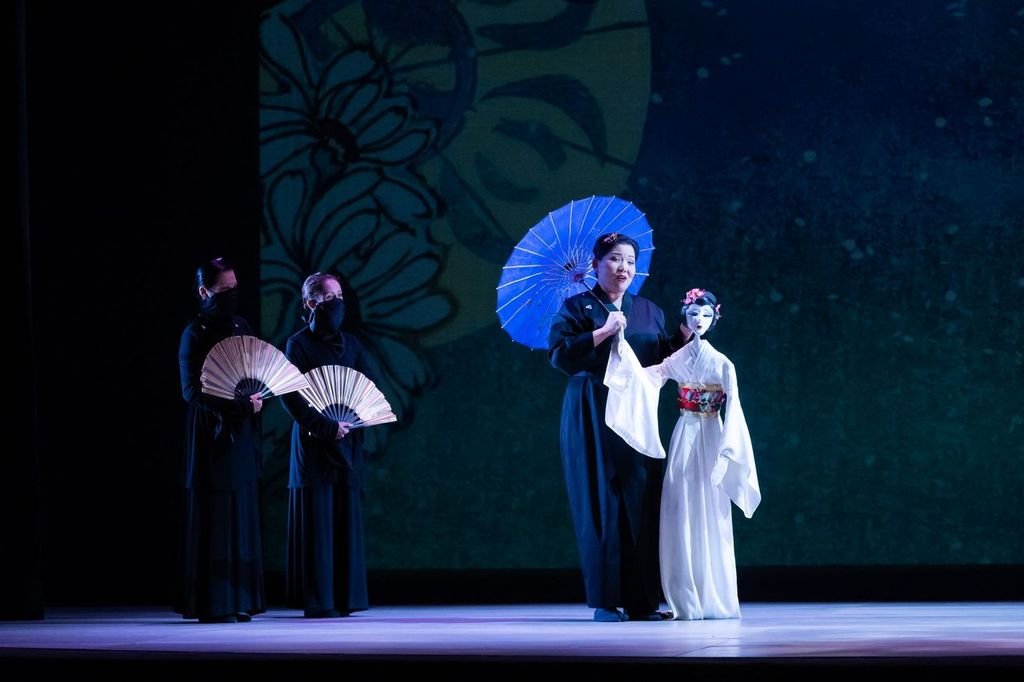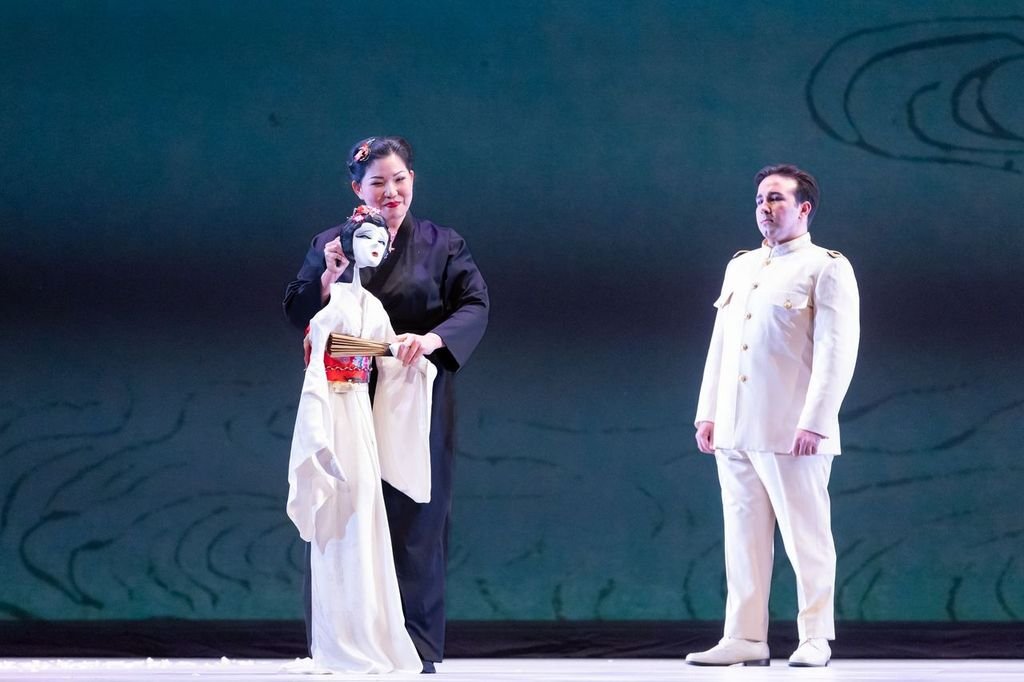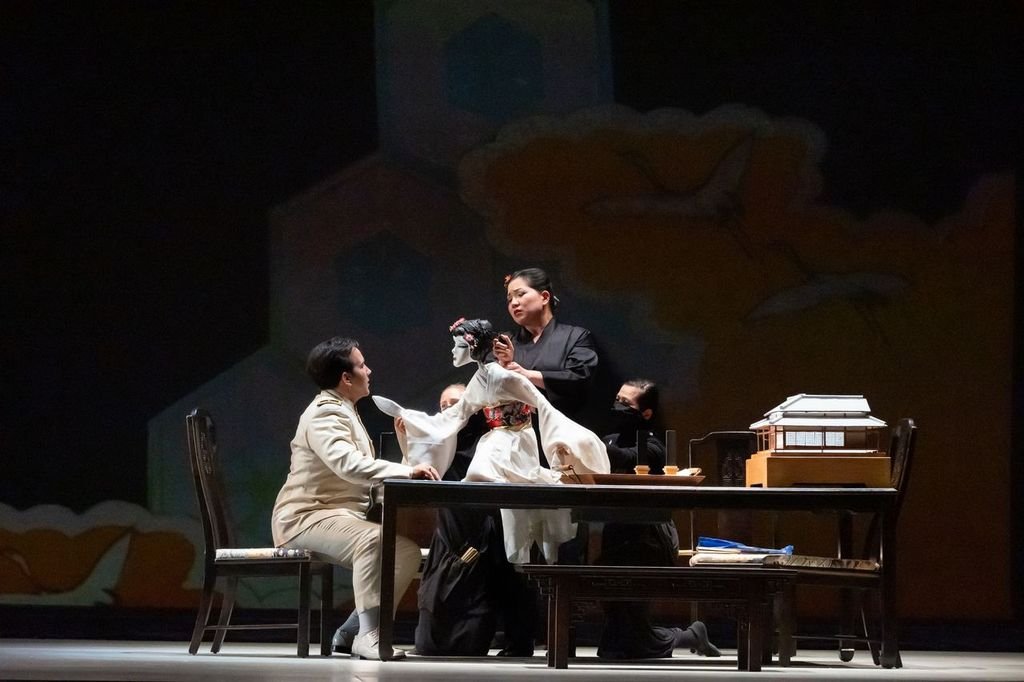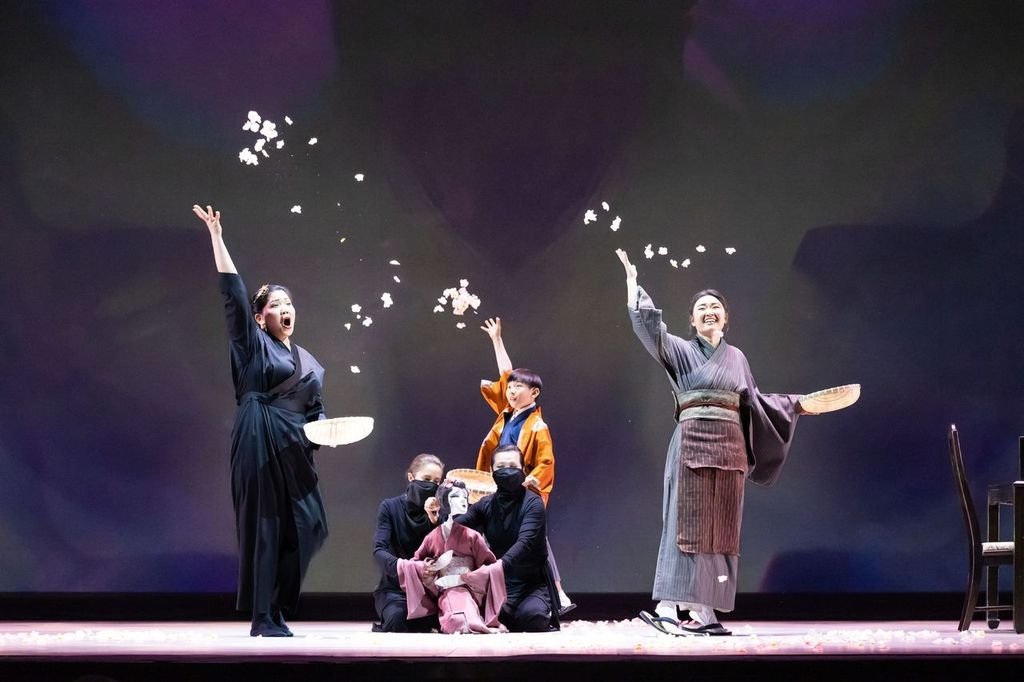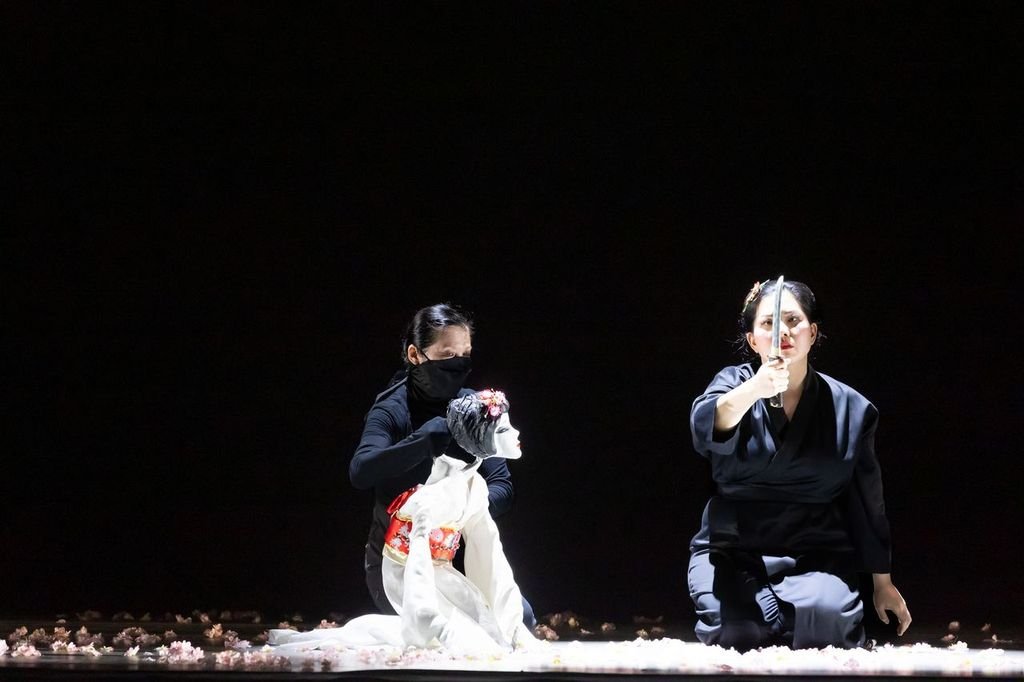There was an unsettled feeling in the pit of my stomach when I sat down Saturday night in the Academy of Music to watch Opera Philadelphia’s new production of Puccini’s Madame Butterfly. The company had widely broadcast that with this production they wanted to address the harm done by the work’s orientalism and creation and promulgation of the stereotype of the submissive Asian woman…and Cio Cio San would be partially played by a puppet! Were they going to blow up this truly great operatic work, beloved by millions over its 120-year history? It didn’t help that NY Times critic Zachary Woolfe had published an article three weeks ahead of the opera’s opening night, accusing it of seeming “to want to apologize for the production’s very existence”. I am happy to be able to report that, to the contrary, this production features amazing singing, brilliant theater, the opera’s great music and libretto intact, offering a more complex treatment of Puccini’s great opera.
Cio Cio San (Karen Chia-Ling Ho and puppet) with puppet artists Hua Hua Zhang and Jacinta Yelland in the background. Photo by Sofia Negron; courtesy of Opera Philadelphia.
Madame Butterfly (1904) by Giacomo Puccini and librettists Luigi Illica and Giuseppe Giacosa, based on the eponymous play by David Belasco, tells the tragic story of a 15-year-old Geisha, Cio Cio San, known by her friends as Butterfly. She has fallen in love with and decided to cast her fate with Lt. Pinkerton of the US Navy at the turn of the 20th century, a time when Japan was still a mysterious Far Eastern country that the West knew little about. Enchanted and infatuated with Cio Cio San’s doll like behavior, Pinkerton arranges to marry her through the marriage broker Goro and buys a home for them in Nagasaki. Spoiler alert for the following description: Cio Cio San has totally committed to the relationship, even adopting the Christian religion, causing her family to disown her. Pinkerton never intended permanence, planning to have a “real marriage” one day with an American woman back home. Pinkerton soon returns to the US, promising his Japanese bride he will return. Cio Cio San endures three years without him, remaining faithful and hopeful. When he learns that she has born him a son, now three years old, he returns with his American wife intent on taking his son back to the US. Cio Cio San agrees if Pinkerton will come to see her. When he arrives, she has ended her life.
Cio Cio San (puppet and Karen Chia-Ling Ho) and Lt. Pinkerton (Anthony Ciaramitaro). Photo by Sofia Negron; courtesy of Opera Philadelphia.
Opera Philadelphia wanted this to be a new version of the opera and consulted with members of the Asian community for advice. They engaged Yuki Izumihara for production design and Ethan Heard, as director. Mr. Heard is the co-founder of Heartbeat Opera, celebrated for presenting classic operas modernized for today’s audiences. He wanted to create a staging that addressed the issues of stereotyping and cultural misinterpretation. Several times in the opera, Cio Cio San is referred to as doll-like. Ms. Izumihara who first saw Madame Butterfly in 2019 loved the music but was made uncomfortable, feeling “uprooted” by the text. She asserts that Puccini and others fell into a trap by creating false images that live on, especially for works as popular as Puccini’s opera. She conceived the idea of having Cio Cio San played by a real doll, a puppet, explaining that in Japan dolls are not simply thrown away but given a proper good-bye. She desired to “put our emphasis on the future – positivity and empowerment”.
Pinkerton (Anthony Ciaramitaro) and Cio Cio San (puppet and Karen Chia-Ling Ho). Photo by Sofia Negron; courtesy of Opera Philadelphia.
One can easily find articles by both American and Japanese authors that criticize Madame Butterfly and Puccini’s Turandot for engaging in orientalism as well as ones that defend Puccini’s efforts. Other companies have produced Butterfly versions attempting to address these issues, ranging from having Cio Cio San in a California Japanese internment camp of WWII to having the entire production be a figment of Pinkerton’s imagination. OP’s version keeps things the same as the original but adds depth to Cio Cio San’s character. At the same time, there has been no outcry of strong support to stop performing the opera traditionally anywhere, as yet. The music is universally loved, and the opera is one of the most popular today, even in Japan, where many accept it for what it is in order to enjoy the music. Personally, my reaction to Cio Cio San over many performances has been to regard her as a strong and willful young person trying to survive and find a better life, having lost wealth and societal standing after her father committed suicide at the request of the emperor, and who needed to support herself in a male dominated society demanding strict adherence to societal rules. That’s a lot of weight to carry. She endures yet another tragedy and loss of honor when she is misled by the privileged American Pinkerton, who deceived himself that his actions were not harmful, despite warnings from the consul Sharpless.
Cio Cio San (puppet and Karen Chia-Ling Ho behind) seek assurance from conflicted consul Sharpless (Anthony Clark Evans). Photo by Sofia Negron; courtesy of Opera Philadelphia.
I suppose that truth in advertising required OP to make their intentions widely known, but I almost wish they had saved that discussion until the work had been seen. This production is a fine work of art that for me is justified on that basis alone. It adds a modern element of depth to the lead character with the spiritual side beginning to sense all is not well, while allowing Puccini’s great music and the universality inherent in the story to endure. It is also a clarion call to everyone to see the “other”, whether the person across the ocean or next door, as the complex, whole individual that they are.
The cast for this production was outstanding. Cio Cio San was played by Opera Philadelphia newcomer, soprano Karen Chia-Ling Ho with a naturalness that made me believe it was Cio Cio San singing. The puppet played the doll persona that Pinkerton fantasized, and the soprano played her spirit, singing as one. Ms. Ho has a lovely voice that she embodies with heart-piercing emotion, singing the role beautifully while amazingly serving for much of the opera as a puppet handler. She was assisted at times in that effort by two handlers on stage in dark uniforms, Hua Hua Zhang, the creator of the puppet and Jacinta Yelland. The puppet Cio Cio San gave an academy award performance, bending the entire audience to her will. She was captivating with head movements and gestures fully displaying the emotions she was experiencing, at times loving in Pinkerton’s arms and at times shaking on the floor from fear and heartbreak. I was drawn into the fantasy.
Maid Suzuki (Kristen Choi) chastises marriage broker Goro (Martin Bakari). Photo by Sofia Negron; courtesy of Opera Philadelphia.
Newcomer to OP, tenor Anthony Ciaramitaro who played Pinkerton has a powerful instrument, and sang marvously, a very satisfying Pinkerton. Baritone Anthony Clark Evans, last seen at OP as Rigoletto also sang well and was convincing as the conflicted consul. OP veteran Kristen Choi, amazing in everything she does, was a standout, singing and acting as Cio Cio San’s maid Suzuki, whether trying to soothe her mistress or expressing the trauma of what was happening. Tenor Martin Bakari provided an effective Goro, the marriage broker. There were many supporting cast members who participated effectively in supporting the drama and enhancing the production. In other solo roles, baritone Kyle Miller played the role of the suitor Yamadori and mezzo-soprano Anne Marie Stanley played the role of Kate Pinkerton. The son was well played by young actor Jayden Wu.
The happy morning of Pinkerton’s arrival for (l to r) Cio Cio San (Karen Chia-Ling Ho and puppet backed by puppet artists), the son Trouble (Jayden Wu), and Suzuki (Kristen Choi). Photo by Sofia Negron; courtesy of Opera Philadelphia.
Puccini’s gorgeous music for Madame Butterfly is critical in powerfully conveying the emotions in this drama. The Opera Philadelphia Orchestra led by Conductor Corrado Rovaris played the score beautifully. I was aware time and again of how I was being affected, with my emotions led and enhanced by the music. Puccini’s use of themes from Japanese folk songs and the US national anthem has been criticized at times, but the beauty of the music cannot be challenged. Director Heard chose to place the Opera Philadelphia Chorus in boxes on each side of the stage, creating a pleasing enhanced stereophonic effect. The chorus was a strong addition to the performance singing with clarity and feeling, led by Chorus Master Elizabeth Braden.
Reality sets in and Cio Cio San (puppet backed by puppet artist and Karen Chia-Ling Ho) decides she cannot tolerate a life of dishonor. Photo by Sofia Negron; courtesy of Opera Philadelphia.
The set for the production was a sparely furnished room in Pinkerton’s house, with a model of the house on a substantial, ornate dining table. A screen behind the room showed atmospheric images with the viewing area opening and closing following the movements of the performers. The costumes for the principals and supporting cast were appropriate. Clearly, the focus of this production was on the characterizations and the emotions of the singer actors. The novel use of puppetry was undoubtedly a contributing factor in the strong attendance at the performances. The beautiful and entrancing puppet was made by Philadelphia-based puppet artist Hua Hua Zhang, also on stage as the chief puppeteer. The life-like movements were very effective in eliciting reactions from the audience.
Another novel and affecting element of the performance was OP’s use of the opportunity during the musical interlude between acts at the beginning of act III to show photos and a listing of accomplishments on the screen at the back of the set of Japanese and Japanese American women activists surrounding the time period of the opera, offering strong counterexamples to the submissive woman stereotype.
I recommend seeing both the traditional versions of Madame Butterfly and Opera Philadelphia’s version, keeping an open mind and an awareness of the issues during both.
The Fan Experience: Madame Butterfly performances were scheduled for April 26, 28, May 3 and 5. The limited tickets remaining can be accessed through this link. Performed in Italian with English supertitles.

